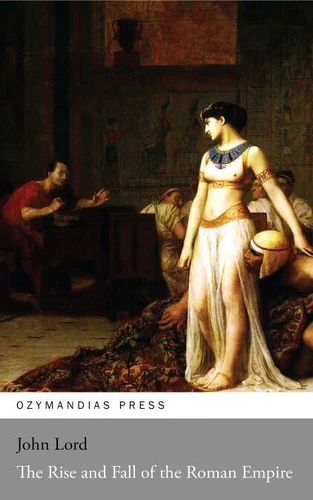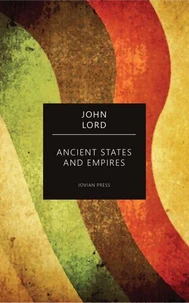The Rise and Fall of the Roman Empire
Par :Formats :
Disponible dans votre compte client Decitre ou Furet du Nord dès validation de votre commande. Le format ePub est :
- Compatible avec une lecture sur My Vivlio (smartphone, tablette, ordinateur)
- Compatible avec une lecture sur liseuses Vivlio
- Pour les liseuses autres que Vivlio, vous devez utiliser le logiciel Adobe Digital Edition. Non compatible avec la lecture sur les liseuses Kindle, Remarkable et Sony
 , qui est-ce ?
, qui est-ce ?Notre partenaire de plateforme de lecture numérique où vous retrouverez l'ensemble de vos ebooks gratuitement
Pour en savoir plus sur nos ebooks, consultez notre aide en ligne ici
- Nombre de pages132
- FormatePub
- ISBN978-1-5312-9194-5
- EAN9781531291945
- Date de parution13/04/2018
- Protection num.Digital Watermarking
- Taille426 Ko
- Infos supplémentairesepub
- ÉditeurJovian Press
Résumé
The assassination of Cæsar was not immediately followed with the convulsions which we should naturally expect. The people were weary of war, and sighed for repose, and, moreover, were comparatively indifferent on whom the government fell, since their liberties were hopelessly prostrated. Only one thing was certain, that power would be usurped by some one, and most probably by the great chieftains who represented Cæsar's interests.
The most powerful men in Rome at this time, were Marcus Antonius, the most able of Cæsar's lieutenants, the most constant of his friends, and the nearest of his relatives, although a man utterly unprincipled; Octavius, grandson of Julius, whom Cæsar adopted as his heir, a young man of nineteen; Lepidus, colleague consul with Cæsar, the head of the ancient family of the Lepidi, thirteen of whom had been honored with curule magistracies; Sextus Pompeius, son of Pompey; Brutus and Cassius, chief conspirators; Dolabella, a man of consular rank, and one of the profligate nobles of his time; Hirtia and Pansa, consuls; Piso, father-in-law of Cæsar, of a powerful family, which boasted of several consuls; and Cicero - still influential from his great weight of character.
All these men were great nobles, and had filled the highest offices...
The most powerful men in Rome at this time, were Marcus Antonius, the most able of Cæsar's lieutenants, the most constant of his friends, and the nearest of his relatives, although a man utterly unprincipled; Octavius, grandson of Julius, whom Cæsar adopted as his heir, a young man of nineteen; Lepidus, colleague consul with Cæsar, the head of the ancient family of the Lepidi, thirteen of whom had been honored with curule magistracies; Sextus Pompeius, son of Pompey; Brutus and Cassius, chief conspirators; Dolabella, a man of consular rank, and one of the profligate nobles of his time; Hirtia and Pansa, consuls; Piso, father-in-law of Cæsar, of a powerful family, which boasted of several consuls; and Cicero - still influential from his great weight of character.
All these men were great nobles, and had filled the highest offices...
The assassination of Cæsar was not immediately followed with the convulsions which we should naturally expect. The people were weary of war, and sighed for repose, and, moreover, were comparatively indifferent on whom the government fell, since their liberties were hopelessly prostrated. Only one thing was certain, that power would be usurped by some one, and most probably by the great chieftains who represented Cæsar's interests.
The most powerful men in Rome at this time, were Marcus Antonius, the most able of Cæsar's lieutenants, the most constant of his friends, and the nearest of his relatives, although a man utterly unprincipled; Octavius, grandson of Julius, whom Cæsar adopted as his heir, a young man of nineteen; Lepidus, colleague consul with Cæsar, the head of the ancient family of the Lepidi, thirteen of whom had been honored with curule magistracies; Sextus Pompeius, son of Pompey; Brutus and Cassius, chief conspirators; Dolabella, a man of consular rank, and one of the profligate nobles of his time; Hirtia and Pansa, consuls; Piso, father-in-law of Cæsar, of a powerful family, which boasted of several consuls; and Cicero - still influential from his great weight of character.
All these men were great nobles, and had filled the highest offices...
The most powerful men in Rome at this time, were Marcus Antonius, the most able of Cæsar's lieutenants, the most constant of his friends, and the nearest of his relatives, although a man utterly unprincipled; Octavius, grandson of Julius, whom Cæsar adopted as his heir, a young man of nineteen; Lepidus, colleague consul with Cæsar, the head of the ancient family of the Lepidi, thirteen of whom had been honored with curule magistracies; Sextus Pompeius, son of Pompey; Brutus and Cassius, chief conspirators; Dolabella, a man of consular rank, and one of the profligate nobles of his time; Hirtia and Pansa, consuls; Piso, father-in-law of Cæsar, of a powerful family, which boasted of several consuls; and Cicero - still influential from his great weight of character.
All these men were great nobles, and had filled the highest offices...







